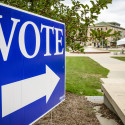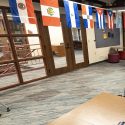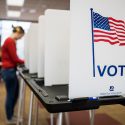New resources, upcoming discussions to help campus prepare for and reflect on presidential election
While all presidential elections are consequential, this year’s vote on Nov. 3 can seem especially momentous, playing out as it is amidst a global pandemic, climate change, a movement for racial justice, and a deeply polarized electorate.
And for many UW–Madison students, the election carries added significance — it will be the first time they’ve been eligible to vote for the country’s leader.
To help the campus community navigate the days and weeks ahead, university officials will be offering several opportunities to engage in civic dialogue, build community, and discuss the election both before and after the vote.
“We want to make sure students, faculty and staff have the resources they need as they prepare for and reflect on the election,” says Gabe Javier, associate vice chancellor for student affairs in the areas of identity and inclusion. “The debate around this election has been passionate and often contentious, and that’s unlikely to end regardless of the vote’s outcome.”
The Office of Inclusion Education is offering new resources and tools related to creating dialogue, including two virtual panel discussions prior to the election:
- Fostering Dialogue and Community in the Current Sociopolitical Climate (Thursday, Oct. 29, noon to 1 p.m.): The human need for fulfilling relationships and supportive communities will persist beyond the election, throughout the pandemic, and alongside the movement for racial justice. Students and staff on the panel will discuss how to navigate difficult conversations and to build or repair student communities in a polarized climate. Submit questions for this panel here. The panel will be closed-captioned and available for later viewing.
- Unpacking the Impact of the Election on Underrepresented Communities (Monday, Nov. 2, noon to 1 p.m.): Panelists will provide insights into the potential impacts of the presidential election on communities of color, people with disabilities, LGBTQ+ communities, and other underrepresented populations. Panelists will share personal experiences and discuss resources available to support marginalized communities. Submit questions for this panel here. The panel will be closed-captioned and available for later viewing.
Following the election, the Office of Inclusion Education will host “processing spaces,” an approach Student Affairs has taken following many events of national, community and campus impact (registration and times coming soon):
- Continuing Dialogue and Community Building in the Current Political Climate (Thursday, Nov. 5)
- Post Election: Unpacking the Impact on Underrepresented Communities (Friday, Nov. 6)
“This year has been especially difficult for many members of our campus community for a variety of reasons, ranging from COVID-19 to racial and social justice issues,” says Ida Balderrama-Trudell, interim director of the Office of Inclusion Education. “The intent of these panels and processing spaces is to create a virtual space for students and staff to gain tools, insights and support for having difficult conversations related to the results of the election and beyond.”
As other events and processing spaces are created or shared, the use of #uwcreatingdialogue is encouraged on today.wisc.edu and other social media.
The Office of Inclusion Education, part of Student Affairs, was formed in August 2020 to elevate and prioritize diversity, equity and inclusion for all students at UW. The effort to provide people with tools and opportunities to dialogue about the 2020 election is a collaborative project involving many entities across campus, including Student Affairs, the Morgridge Center for Public Service, and the Center for Leadership & Involvement.
University Health Services (UHS) reminds students that it provides support for all health-related concerns, including those that might be exacerbated by the stress of the election season. It is offering a number of mental health resources. Students can:
- Sign up for a consultation with a counselor to discuss concerns about the election (or other topics). See the Let’s Talk page for full schedule and sign-up link.
- Join Coping with Election Stress on Wednesday, Nov. 4, at 5:30 p.m. This virtual processing space will be focused on helping students processing stress related to the election.
- Attend the Living with Uncertainty workshop on Tuesday, Nov. 10, at 5:30 p.m. Participants will discuss things that feel uncertain during this time and learn skills/tools to navigate them.



